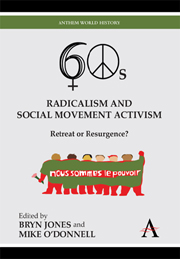Book contents
- Frontmatter
- Contents
- Introduction Sixties Radicalism: Creating Spaces and Leaving Legacies
- PART I Radical Movements Around the World
- 1 All Along the Watershed: Sixties Values as Defence of Community Lifeworlds in Britain 1968–2008
- 2 May's Tensions Today: France, Then and Now
- 3 The War Against the War: Violence and Anticolonialismm, in the Final Years of the Estado Novo
- 4 From Sartre to Stevedores: The Connections between the Paris Barricades and the Re-emergence of Black Trades Unions in South Africa
- 5 1968 – Was it Really a Year of Social Change in Pakistan?
- PART II Theoretical & Cultural Significance
- PART III Social Movement Legacies
- Conclusion
- Notes on Contributors
- Author Index
- Subject Index
4 - From Sartre to Stevedores: The Connections between the Paris Barricades and the Re-emergence of Black Trades Unions in South Africa
from PART I - Radical Movements Around the World
Published online by Cambridge University Press: 05 March 2012
- Frontmatter
- Contents
- Introduction Sixties Radicalism: Creating Spaces and Leaving Legacies
- PART I Radical Movements Around the World
- 1 All Along the Watershed: Sixties Values as Defence of Community Lifeworlds in Britain 1968–2008
- 2 May's Tensions Today: France, Then and Now
- 3 The War Against the War: Violence and Anticolonialismm, in the Final Years of the Estado Novo
- 4 From Sartre to Stevedores: The Connections between the Paris Barricades and the Re-emergence of Black Trades Unions in South Africa
- 5 1968 – Was it Really a Year of Social Change in Pakistan?
- PART II Theoretical & Cultural Significance
- PART III Social Movement Legacies
- Conclusion
- Notes on Contributors
- Author Index
- Subject Index
Summary
Introduction
Two major discourses of change in the 1960s, student revolt and black consciousness, were introduced to South Africa primarily through, literature, music, and individual agency. The knowledge transfer helped to define and transform resistance to apartheid from liberal expressions and values to ideologically informed New Left activism. The impact of this shift and the forms it took had highly significant long term outcomes for South Africa, but the perception of South Africa as an isolated place disconnected from early forms of globalization has become a self reflective trope and the significance of links with global changes are not recognized.
In this chapter I will not examine the links between black consciousness (BC) and developments in the USA. There are intimate connections between BC and Anglophone students, but it is rather, the narrative of the shifts, influences and changes represented by the events of 1968 and their impact on mainly Anglophone students on which this chapter focuses. It will look particularly at the linkages between radical ideas and movements in Europe and North America and the role of radicalized white students in assisting black workers struggles against the apartheid regime. Academically the transition from liberal to class based historiography was to have a profound impact on students and future leaders in the post 1994 South African government.
- Type
- Chapter
- Information
- Sixties Radicalism and Social Movement ActivismRetreat or Resurgence?, pp. 59 - 72Publisher: Anthem PressPrint publication year: 2010
- 1
- Cited by



